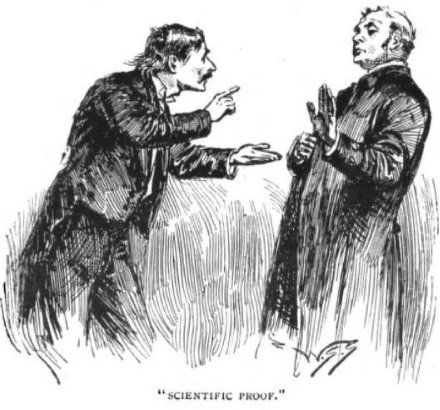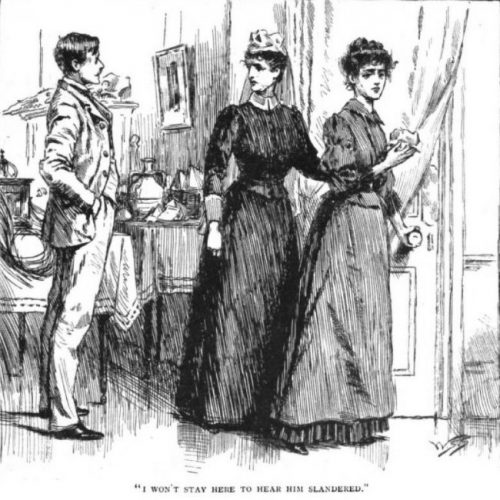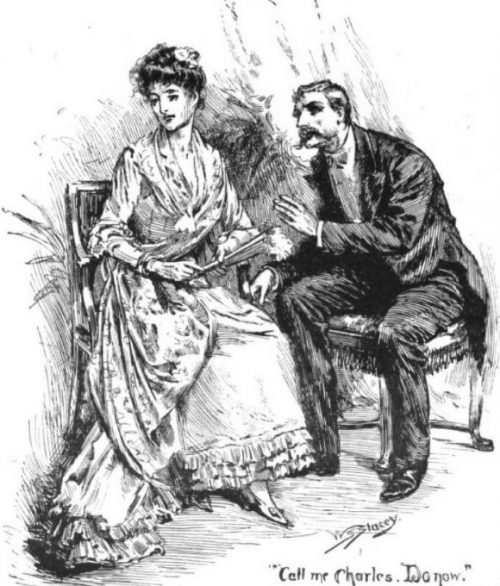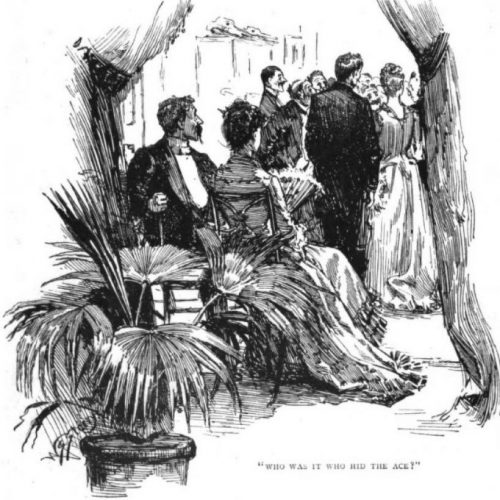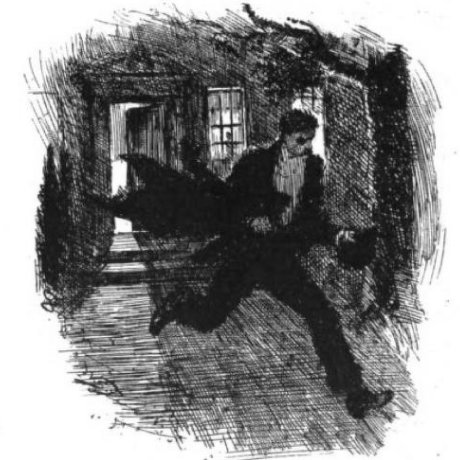The Voice of Science by Arthur Conan Doyle
The Voice of Science
by
Sir Arthur Conan Doyle
Published in Strand Magazine, March 1891.
The Voice of Science
Mrs. Esdaile, of the Lindens, Birchespool, was a lady of quite remarkable scientific attainments. As honorary secretary of the ladies’ branch of the local Eclectic Society, she shone with a never-failing brilliance. It was even whispered that on the occasion of the delivery of Professor Tomlinson’s suggestive lecture “On the Perigenesis of the Plastidule” she was the only woman in the room who could follow the lecturer even as far as the end of his title. In the seclusion of the Lindens she supported Darwin, laughed at Mivart, doubted Haeckel, and shook her head at Weissman, with a familiarity which made her the admiration of the University professors and the terror of the few students who ventured to cross her learned but hospitable threshold. Mrs. Esdaile had, of course, detractors. It is the privilege of exceptional merit. There were bitter feminine whispers as to the cramming from encyclopzedias and text-books which preceded each learned meeting, and as to the care with which in her own house the conversation was artfully confined to those particular channels with which the hostess was familiar. Tales there were, too, of brilliant speeches written out in some masculine hand, which had been committed to memory by the ambitious lady, and had afterwards flashed out as extempore elucidations of some dark, half-explored corner of modern science. It was even said that these little blocks of information got jumbled up occasionally in their bearer’s mind, so that after an entomological lecture she would burst into a geological harangue, or vice versa, to the great confusion of her audience. So ran the gossip of the malicious, but those who knew her best were agreed that she was a very charming and clever little person.
It would have been a strange thing had Mrs. Esdaile not been popular among local scientists, for her pretty house, her charming grounds, and all the hospitality which an income of two thousand a year will admit of, were always at their command. On her pleasant lawns in the summer, and round her drawing-room fire in the winter, there was much high talk of microbes, and leucocytes, and sterilised bacteria, where thin, ascetic materialists from the University upheld the importance of this life against round, comfortable champions of orthodoxy from the Cathedral Close. And in the heat of thrust and parry, when scientific proof ran full tilt against inflexible faith, a word from the clever widow, or an opportune rattle over the keys by her pretty daughter Rose, would bring all back to harmony once more.
Rose Esdaile had just passed her twentieth year, and was looked upon as one of the beauties of Birchespool. Her face was, perhaps, a trifle long for perfect symmetry, but her eyes were fine, her expression kindly, and her complexion beautiful. It was an open secret, too, that she had under her father’s will five hundred a year in her own right. With such advantages a far plainer girl than Rose Esdaile might create a stir in the society of a provincial town.
A scientific conversazione in a private house is an onerous thing to organise, yet mother and daughter had not shrunk from the task. On the morning of which I write, they sat together surveying their accomplished labours, with the pleasant feeling that nothing remained to be done save to receive the congratulations of their friends. With the assistance of Rupert, the son of the house, they had assembled from all parts of Birchespool objects of scientific interest, which now adorned the long tables in the drawing-room. Indeed, the full tide of curiosities of every sort which had swelled into the house had overflowed the rooms devoted to the meeting, and had surged down the broad stairs to invade the dining-room and the passage. The whole villa had become a museum. Specimens of the flora and fauna of the Philippine Islands, a ten-foot turtle carapace from the Gallapagos, the os frontis of the Bos montis as shot by Captain Charles Beesly in the Thibetan Himalayas, the bacillus of Koch cultivated on gelatine—these and a thousand other such trophies adorned the tables upon which the two ladies gazed that morning.
“You’ve really managed it splendidly, ma,” said the young lady, craning her neck up to give her mother a congratulatory kiss. “It was so brave of you to undertake it.”
“I think that it will do,” purred Mrs. Esdaile complacently. “But I do hope that the phonograph will work without a hitch. You know at the last meeting of the British Association I got Professor Standerton to repeat into it his remarks on the life history of the Medusiform Gonophore.”
“How funny it seems,” exclaimed Rose, glancing at the square box-like apparatus, which stood in the post of honour on the central table, “to think that this wood and metal will begin to speak just like a human being.”
“Hardly that, dear. Of course the poor thing can say nothing except what is said to it. You always know exactly what is coming. But I do hope that it will work all right.”
“Rupert will see to it when he comes up from the garden. He understands all about them. Oh, ma, I feel so nervous.”
Mrs. Esdaile looked anxiously down at her daughter, and passed her hand caressingly over her rich brown hair. “I understand,” she said, in her soothing, cooing voice, “I understand.”
“He will expect an answer to-night, ma.”
“Follow your heart, child. I am sure that I have every confidence in your good sense and discretion. I would not dictate to you upon such a matter.”
“You are so good, ma. Of course, as Rupert says, we really know very little of Charles—of Captain Beesly. But then, ma, all that we do know is in his favour.”
“Quite so, dear. He is musical, and well-informed, and good-humoured, and certainly extremely handsome. It is clear, too, from what he says, that he has moved in the very highest circles.”
“The best in India, ma. He was an intimate friend of the Governor-General’s. You heard yourself what he said yesterday about the D’Arcies, and Lady Gwendoline Fairfax, and Lord Montague Grosvenor.”
“Well, dear,” said Mrs. Esdaile resignedly, “you are old enough to know your own mind. I shall not attempt to dictate to you. I own that my own hopes were set upon Professor Stares.”
“Oh, ma, think how dreadfully ugly he is.”
“But think of his reputation, dear. Little more than thirty, and a member of the Royal Society.”
“I couldn’t ma. I don’t think I could, if there was not another man in the world. But, oh, I do feel so nervous; for you can’t think how earnest he is. I must give him an answer to-night. But they will be here in an hour. Don’t you think that we had better go to our rooms?”
The two ladies had risen, when there came a quick masculine step upon the stairs, and a brisk young fellow, with curly black hair, dashed into the room.
“All ready?” he asked, running his eyes over the lines of relic-strewn tables.
“All ready, dear,” answered his mother.
“Oh, I am glad to catch you together,” said he, with his hands buried deeply in his trouser pockets, and an uneasy expression on his face. “There’s one thing that I wanted to speak to you about. Look here, Rosie; a bit of fun is all very well; but you wouldn’t be such a little donkey as to think seriously of this fellow Beesly?”
“My dear Rupert, do try to be a little less abrupt,” said Mrs. Esdaile, with a deprecating hand outstretched.
“I can’t help seeing how they have been thrown together. I don’t want to be unkind, Rosie; but I can’t stand by and see you wreck your life for a man who has nothing to recommend him but his eyes and his moustache. Do be a sensible girl, Rosie, and have nothing to say to him.”
“It is surely a point, Rupert, upon which I am more fitted to decide than you can be,” remarked Mrs. Esdaile, with dignity.
“No, mater, for I have been able to make some inquiries. Young Cheffington, of the Gunners, knew him in India. He says—”
But his sister broke in upon his revelations. “I won’t stay here, ma, to hear him slandered behind his back,” she cried, with spirit. “He has never said anything that was not kind of you, Rupert, and I don’t know why you should attack him so. It is cruel, unbrotherly.” With a sweep and a whisk she was at the door, her cheek flushed, her eyes sparkling, her bosom heaving with this little spurt of indignation, while close at her heels walked her mother with soothing words, and an angry glance thrown back over her shoulder. Rupert Esdaile stood with his hands burrowing deeper and deeper into his pockets, and his shoulders rising higher and higher to his ears, feeling intensely guilty, and yet not certain whether he should blame himself for having said too much or for not having said enough.
Just in front of him stood the table on which the phonograph, with wires, batteries, and all complete, stood ready for the guests whom it was to amuse. Slowly his hands emerged from his pockets as his eye fell upon the apparatus, and with languid curiosity he completed the connection, and started the machine. A pompous, husky sound, as of a man clearing his throat proceeded from the instrument, and then in high, piping tones, thin but distinct, the commencement of the celebrated scientist’s lecture. “Of all the interesting problems,” remarked the box, “which are offered to us by recent researches into the lower orders of marine life, there is none to exceed the retrograde metamorphosis which characterises the common barnacle. The differentiation of an amorphous protoplasmic mass—” Here Rupert Esdaile broke the connection again, and the funny little tinkling voice ceased as suddenly as it began.
The young man stood smiling, looking down at this garrulous piece of wood and metal, when suddenly the smile broadened, and a light of mischief danced up into his eyes. He slapped his thigh, and danced round in the ecstasy of one who has stumbled on a brand-new brilliant idea. Very carefully he drew forth the slips of metal which recorded the learned Professor’s remarks, and laid them aside for future use. Into the slots he thrust virgin plates, all ready to receive an impression, and then, bearing the phonograph under his arm, he vanished into his own sanctum. Five minutes before the first guests had arrived the machine was back upon the table, and all ready for use.
There could be no question of the success of Mrs. Esdaile’s conversazione. From first to last everything went admirably. People stared through microscopes, and linked hands for electric shocks, and marvelled at the Gallapagos turtle, the os frontis of the Bos montis, and all the other curiosities which Mrs. Esdaile had taken such pains to collect. Groups formed and chatted round the various cases. The Dean of Birchespool listened with a protesting lip, while Professor Maunders held forth upon a square of triassic rock, with side-thrusts occasionally at the six days of orthodox creation; a knot of specialists disputed over a stuffed ornithorhynchus in the corner; while Mrs. Esdaile swept from group to group, introducing, congratulating, laughing, with the ready, graceful tact of a clever woman of the world. By the window sat the heavily-moustached Captain Beesly, with the daughter of the house, and they discussed a problem of their own, as old as the triassic rock, and perhaps as little understood.
“But I must really go and help my mother to entertain, Captain Beesly,” said Rose at last, with a little movement as if to rise.
“Don’t go, Rose. And don’t call me Captain Beesly; call me Charles. Do, now!”
“Well, then, Charles.”
“How prettily it sounds from your lips! No, now, don’t go. I can’t bear to be away from you. I had heard of love, Rose; but how strange it seems that I, after spending my life amid all that is sparkling and gay, should only find out now, in this little provincial town, what love really is!”
“You say so; but it is only a passing fancy.”
“No, indeed. I shall never leave you, Rose—never, unless you drive me away from your side. And you would not be so cruel—you would not break my heart?”
He had very plaintive, blue eyes, and there was such a depth of sorrow in them as he spoke that Rose could have wept for sympathy.
“I should be very sorry to cause you grief in any way,” she said, in a faltering tone.
“Then promise—”
“No, no; we cannot speak of it just now, and they are collecting round the phonograph. Do come and listen to it. It is so funny. Have you ever heard one?”
“Never.”
“It will amuse you immensely. And I am sure that you would never guess what it is going to talk about.”
“What then?”
“Oh, I won’t tell you. You shall hear. Let us have these chairs by the open door; it is so nice and cool.”
The company had formed an expectant circle round the instrument. There was a subdued hush as Rupert Esdaile made the connection, while his mother waved her white hand slowly from left to right to mark the cadence of the sonorous address which was to break upon their ears.
“How about Lucy Araminta Pennyfeather?” cried a squeaky little voice. There was a rustle and a titter among the audience. Rupert glanced across at Captain Beesly. He saw a drooping jaw, two protruding eyes, and a face the colour of cheese.
“How about little Martha Hovedean of the Kensal Choir Union?” cried the piping voice.
Louder still rose the titters. Mrs. Esdaile stared about her in bewilderment. Rose burst out laughing, and the Captain’s jaw drooped lower still, with a tinge of green upon the cheese-like face.
“Who was it who hid the ace in the artillery card-room at Peshawur? Who was it who was broke in consequence? Who was it—”
“Good gracious!” cried Mrs. Esdaile, “what nonsense is this? The machine is out of order. Stop it, Rupert. These are not the Professor’s remarks. But, dear me, where is our friend Captain Beesly gone?”
“I am afraid that he is not very well, ma,” said Rose. “He rushed out of the room.”
“There can’t be much the matter,” quoth Rupert. “There he goes, cutting down the avenue as fast as his legs will carry him. I do not think, somehow, that we shall see the Captain again. But I must really apologise. I have put in the wrong slips. These, I fancy are those which belong to Professor Standerton’s lecture.”
Rose Esdaile has become Rose Stares now, and her husband is one of the most rising scientists in the provinces. No doubt she is proud of his intellect and of his growing fame, but there are times when she still gives a thought to the blue-eyed Captain, and marvels at the strange and sudden manner in which he deserted her.

